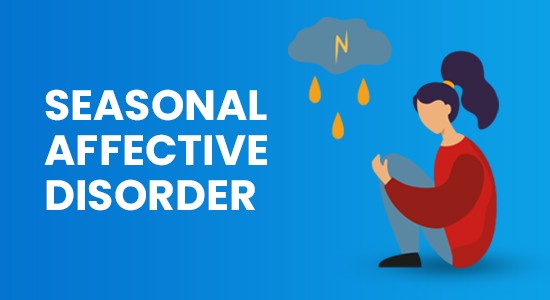SEASONAL AFFECTIVE DISORDER
SEASONAL AFFECTIVE DISORDER
Seasonal Affective Disorder (SAD) is a type of depression that typically occurs during specific seasons, most commonly during the fall and winter months when daylight hours are shorter. It is also known as winter depression or winter blues. SAD is believed to be related to the decrease in sunlight exposure during these seasons, which can disrupt the body’s internal clock and affect neurotransmitter levels in the brain.
The exact cause of SAD is not fully understood, but several factors are thought to contribute to its development. These factors include:

- Reduced sunlight: The decrease in sunlight during fall and winter can disrupt the body’s circadian rhythm, leading to changes in hormone levels, sleep patterns, and mood.
- Melatonin levels: Reduced sunlight can also increase the production of melatonin, a hormone that regulates sleep and mood. Increased melatonin levels can lead to symptoms of depression.
- Serotonin levels: Serotonin, a neurotransmitter that affects mood, appetite, and sleep, may be lower in individuals with SAD. Reduced sunlight can contribute to lower serotonin levels, which are associated with depression.
- Biological predisposition: Some individuals may have a genetic or biological predisposition to developing SAD, making them more susceptible to the seasonal changes in light.
Common symptoms of SAD include:
- Persistent feelings of sadness, hopelessness, or irritability.
- Lack of energy and increased fatigue.
- Difficulty concentrating and making decisions.
- Increased appetite, particularly cravings for carbohydrates.
- Weight gain.
- Social withdrawal and decreased interest in activities.
- Increased sleep and difficulty waking up in the morning.
- Loss of interest in sex.
- Suicidal thoughts or behaviors (in severe cases).

Treatment options for SAD include:
- Light therapy: Light therapy involves exposure to bright artificial light that mimics natural sunlight. This treatment is usually administered in the morning and can help regulate circadian rhythms and improve mood.
- Medication: Antidepressant medications, such as selective serotonin reuptake inhibitors (SSRIs), may be prescribed to help alleviate symptoms of SAD.
- Psychotherapy: Cognitive-behavioral therapy (CBT) can be beneficial in managing SAD by helping individuals identify negative thought patterns and develop coping strategies.
- Lifestyle changes: Engaging in regular exercise, maintaining a healthy diet, getting outside during daylight hours, and staying socially active can all help alleviate symptoms of SAD.
- If you or someone you know is experiencing symptoms of SAD, it’s important to consult a healthcare professional for an accurate diagnosis and appropriate treatment options.


